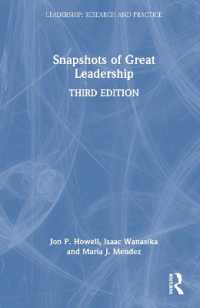- ホーム
- > 洋書
- > 英文書
- > Science / Mathematics
Full Description
For students whose experience with science has been primarily in the classroom, it can be difficult to identify and contact potential mentors, and to navigate the transition to a one-on-one, mentor-student relationship. This is especially true for those who are new to research, or who belong to groups that are underrepresented in research. The Entering Research curriculum offers a mechanism to structure the independent research experience, and help students overco
Contents
Chapter 1: The Entering Research FrameworkChapter 2: Active Learning: Facilitating, Not TeachingFacilitator Roles Facilitating Groups Handling Facilitation ChallengesChapter 3: Building a Trainee Curriculum Using Backward DesignCustom CurriculaComplete CurriculaComplete Curriculum #1 10-Week Summer Research Program for Undergraduate StudentsComplete Curriculum #2 15-Week Seminar for Novice Undergraduate StudentsComplete Curriculum #3 15-Week Seminar for Intermediate Undergraduate StudentsComplete Curriculum #4 15-Week Seminar for Novice Graduate StudentsChapter 4: Strategies and Tools for Assessing Trainee Learning and Evaluating ImplementationsDesigning an Assessment and Evaluation PlanChoosing Assessment and Evaluation ToolsRubric IndexPost-Activity Mini-ReflectionEntering Research Implementation Evaluation SurveyEntering Research Learning Assessment (ERLA) SurveysChapter 5: The Entering Research ActivitiesSummary of Entering Research ActivitiesIntroductory ActivitiesConstructive and Destructive Group BehaviorsSetting the Stage for Inclusive DiscussionsAddressing ConflictAligning Mentor and Trainee ExpectationsArticle Organization, Comprehension, and Recall 96 Case Study: AuthorshipCase Study: Awkward MentorBarriers to Effective CommunicationBias Literacy: Fair Play Video GameChallenges Facing Diverse TeamsCommunicating Research Findings 1: Poster Presentations Communicating Research Findings 2: Oral PresentationsCommunicating Research Findings 3: Developing Your Presentation Communicating Research to the General PublicCoping EfficacyCounter-StorytellingCase Study: Credit Where Credit Is DueDeveloping a Curriculum Vitae Discussion of the Nature of ScienceDiscussion with Experienced Undergraduate ResearchersDiversity in STEM Elevator SentencesEstablishing Your Ideal Thesis CommitteeEthics Case: Discussion with MentorFinding a Research MentorFinding Potential Research Rotation Groups and MentorsFostering Your Own Research Self-EfficacyCase Study: FrustratedFunding Your ResearchGeneral Public AbstractImportance of Reading in Graduate SchoolInterviewing for Graduate SchoolCase Study: Keeping the DataLetter of Recommendation Mentor Biography Mentor Interview about Making Research Posters Messages Sent and Received Mini-Case Studies: Sticky Situations Mini-Grant Proposal My Mentoring and Support Network Networking 1: Introduction to Networking Networking 2: What Should Your Network Look Like? Networking 3: Your Brand Networking 4: Planning for Networking Opportunities and Engaging in Purposeful InteractionsCase Study: Overwhelmed Personal Statement Prioritizing Research Mentor Roles Privilege and White Fragility Professional Development Plans Reflecting on Your Mentoring Relationship Research Articles 1: Introduction Research Articles 2: Guided Reading Research Articles 3: Practical Reading Strategies 366 Research Careers: The Informational Interview Research Documentation: Can You Decipher This? Research Documentation Process Research Experience Reflections 1: Entering Research? Research Experience Reflections 2: Reflection Exercise Research Experience Reflections 3: Research Experience Exit Interview Research Group Diagram Research Group Funding Research Rotation Evaluation Research Writing 1: Background Information and Hypothesis or Research Question Research Writing 2: Research Project Outline and Abstract Research Writing 3: Project Design Research Writing 4: Research Literature Review and Publishing Process Research Writing 5: The Peer-Review Process Research Writing 6: Research Proposal Research Writing 7: Research Paper Case Study: Responding to Feedback Safety Training Checklist Science and Society Science Literacy Test Science or Pseudoscience? Searching Online Databases Case Study: Selection of Data Steps to Researcher Independence Stereotype Threat Summer Undergraduate Research Programs The Next Step in Your Career The Power of Social Persuasion Case Study: The Sharing of Research Materials Three Mentors Three-Minute Research Story Tips for Technical Writers Truth and Consequences Article Undergraduate Thesis 1: Components of an Undergraduate Research Thesis 540 Undergraduate Thesis 2: Thesis Writing Discussion Panel Undergraduate Thesis 3: Developing a Thesis Writing Plan Universalism in STEM: Case Study and Analysis Visiting Peer Research Groups What Happens to Research Results? Case Study: "Whatever you do, don't join our lab." Why Diversity Matters in STEM Research Your Research Group's Focus








